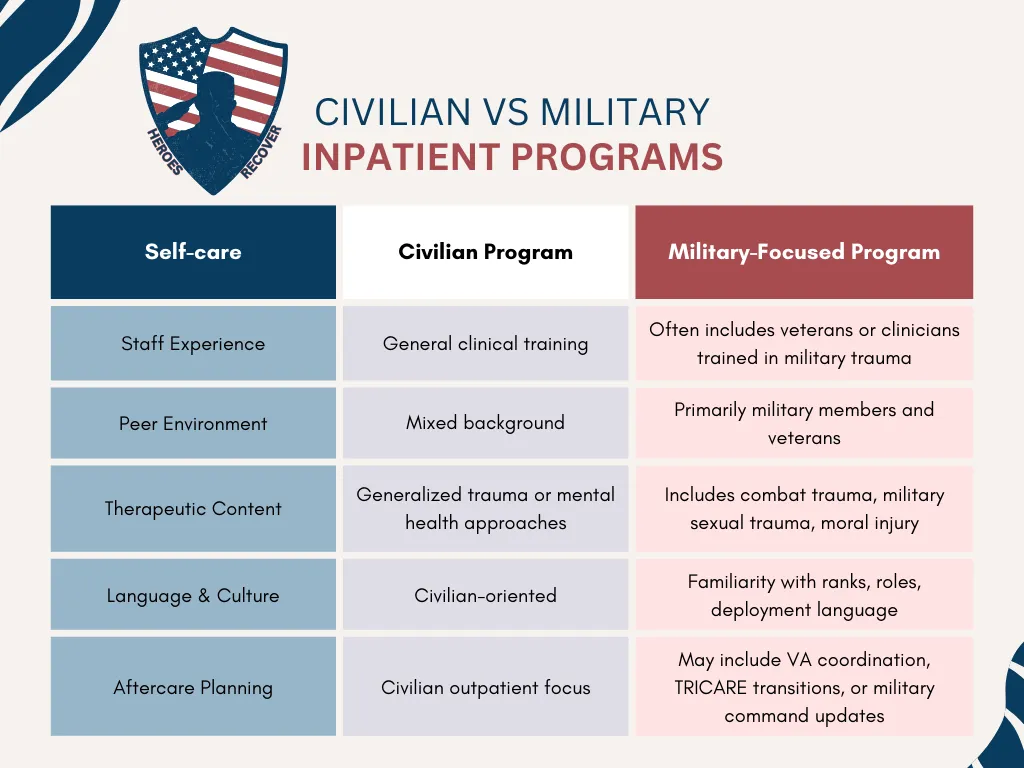Inpatient Military Mental Health Treatment
How to Find Inpatient Mental Health Rehab for Military Members
When we think about the mental health needs of service members and veterans, it’s clear they face unique challenges that require unique solutions. These individuals are only human. From the intensity of combat to the psychological toll of long deployments and reintegration into civilian life, the mental health journey for military personnel is often complex and multifaceted.
Inpatient military mental health treatment is key to addressing these issues with the structure, support, and specialized care many military members need to heal and thrive. In this guide, we’ll break down what inpatient military mental health treatment is, who it’s for, what it involves, and why it can be a game changer for those who serve or have served.
What Is Inpatient Military Mental Health Treatment?

Inpatient mental health treatment means 24/7 care in a structured, hospital-like or residential environment. For military personnel these programs are designed with their unique experiences, traumas and culture in mind. Unlike outpatient care where you can go home after therapy sessions, inpatient care provides round the clock monitoring, medical supervision and a focused healing environment.
This type of care is recommended for those experiencing severe mental health symptoms, co-occurring disorders (like PTSD and substance use), suicidal ideation, or those who haven’t responded well to outpatient therapy. It’s also used as a stepping stone when proceeding to more long-term outpatient treatment after completing initial levels of care.
Why Military Members Need Specialized Mental Health Care
The military experience is unlike any other. Service members go through rigorous physical training, strict discipline, prolonged separation from loved ones, and the constant possibility of combat. These factors can lead to a range of mental health challenges including:
- Post-Traumatic Stress Disorder (PTSD)
- Depression and Anxiety Disorders
- Traumatic Brain Injury (TBI)
- Moral Injury
- Substance Use Disorders (SUDs)
- Adjustment Disorders
- Suicidal Ideation
Traditional mental health treatment may not always resonate with military members. They may feel misunderstood, stigmatized, or reluctant to open up in civilian therapy settings.
Inpatient military mental health treatment programs are built around cultural competence and understanding of the military mindset—values like honor, duty, loyalty, and resilience are recognized and incorporated into therapeutic approaches.
When Is Inpatient Treatment the Right Choice?
Entering inpatient treatment is a big step and for many military members, whether they have been referred by a medical provider or are taking this step on their own. In most cases, they are starting this chapter after months or even years of struggling in silence.
Here are some signs inpatient care might be necessary:
- Intense PTSD symptoms that interfere with daily life
- Severe depression or anxiety that doesn’t improve with outpatient care
- Suicidal thoughts or behaviors
- Substance misuse that’s spiraling out of control
- Unable to manage daily life, relationships, or responsibilities
- Recent crisis or mental health emergency
- Co-occurring mental and physical health issues including chronic pain or TBI
In many cases inpatient care is the safest and most effective environment to stabilize and start meaningful recovery.
What to Expect in an Inpatient Military Mental Health Program
While no two programs are the same, most inpatient military mental health treatment centers follow a structured, evidence-based approach. Here’s what you can expect:
1. Comprehensive Assessment
Upon admission individuals undergo a full physical, psychological and psychiatric evaluation. This includes a review of medical history, trauma history, any past treatments, current symptoms and risk factors. The goal is to create a personalized treatment plan that addresses the individual’s unique needs.
2. 24/7 Supervised Care
One of the hallmarks of inpatient treatment is around-the-clock supervision by medical professionals, psychiatrists, and therapists. This ensures safety and allows for immediate intervention if a crisis arises. It’s especially important for those who are at risk of self-harm or struggling with severe PTSD flashbacks, dissociation, or panic attacks.
3. Individual and Group Therapy

- Cognitive Behavioral Therapy (CBT)
- Eye Movement Desensitization and Reprocessing (EMDR)
- Prolonged Exposure Therapy
- Dialectical Behavior Therapy (DBT)
- Moral Injury Repair Therapy
- Trauma-Informed Therapy
4. Family Involvement
Military culture emphasizes loyalty and unit cohesion—and family is often part of that unit. Many inpatient programs offer family therapy, education sessions, or structured visits to involve loved ones in the healing process. This can be key in rebuilding trust, communication, and support systems after mental health has disrupted relationships.
5. Medication Management
In some cases, psychiatric medication is part of the treatment plan. Whether it’s antidepressants, mood stabilizers, or medication to assist with sleep, all prescriptions are closely monitored and adjusted based on the individual’s response and needs.
6. Holistic and Experiential Therapies
Many modern inpatient facilities incorporate holistic approaches like:
- Mindfulness and meditation
- Yoga and physical fitness
- Art or music therapy
- Equine-assisted therapy
- Adventure or wilderness therapy
These modalities can help veterans reconnect with their bodies, manage stress, and access emotions in nonverbal ways.
7. Transition and Discharge Planning
From day one clinicians begin planning for what comes next. Whether it’s stepping down to outpatient care, entering a sober living home, or returning to duty (if applicable) a personalized aftercare plan ensures continuity and reduces the risk of relapse or regression.
Comprehending the root causes of their struggles and providing tailored treatment options enhances support for veterans on their path to reclaiming their lives.
Civilian vs. Military-Focused Inpatient Programs
Not all inpatient programs are created equal. Military-focused inpatient treatment centers understand the unique nuances of military service. Here are a few key differences:
How to Access Inpatient Military Mental Health Treatment
So how does someone start this journey? Access points can vary based on whether someone is active duty, a veteran or a military family member.
For Active Duty Service Members
Most military personnel can access inpatient care through their branch’s medical facilities or TRICARE-approved civilian programs. They may need to go through their base’s behavioral health clinic or receive a referral from a primary care provider or command.
In emergencies, service members can be hospitalized immediately without a referral. Confidentiality and career concerns are common fears but there are safeguards in place. In fact, seeking help is now widely promoted as a sign of strength, not weakness.
For Veterans
Veterans can access inpatient mental health care through the U.S. Department of Veterans Affairs (VA) or community-based programs that partner with the VA. The VA offers a range of inpatient options including:
- PTSD residential treatment
- Substance use rehabilitation
- Dual diagnosis programs
- Crisis stabilization units
Some nonprofit organizations and private providers also offer veteran-focused care that accepts VA benefits or other forms of coverage.
For Military Families
While spouses and children of service members may not need the same kind of military-specific mental health treatment they too face unique pressures. Inpatient options are more limited but can sometimes be accessed through TRICARE-authorized facilities or community mental health centers.
Breaking the Stigma
Despite the growing awareness and advocacy around mental health in the military, stigma still prevents many from seeking the help they need. The idea that admitting to mental health struggles could hurt one’s career, reputation, or perceived strength runs deep. But here’s the truth: taking action and seeking treatment—especially inpatient care when it’s needed—is one of the bravest most proactive steps a person can take.
Leaders across branches are working hard to normalize mental health care and ensure policies support rather than punish service members who seek help. Initiatives like embedded behavioral health units, peer support programs, and command-level training are creating safer environments for honest conversations.
The Long-Term Benefits of Inpatient Treatment
While inpatient treatment is intensive the benefits can be life-changing. Here’s what many military members and veterans gain:
- Improved symptom management and emotional regulation
- Better relationships with family, peers, and themselves
- Greater insight into their triggers and coping strategies
- Reintegration support for transitioning to civilian life
- Connection to peers who understand the military mindset
- A foundation for lifelong recovery and wellness
- Healthy coping skills and mechanisms
For some inpatient care is the first time in years—or ever—that they feel seen, understood, and supported.
Find Inpatient Military Mental Health Treatment Here
Service members are strong, sacrifice and resilient. But even the strongest need help sometimes. Inpatient military mental health treatment offers a way to heal that acknowledges the experiences of service members and veterans. It’s not just about managing symptoms – it’s about rebuilding lives, restoring hope and redefining what it means to be strong.
If you or someone you know is struggling, know this: You are not alone. Tricare Rehabs can help you find inpatient mental health treatment programs that will give military personnel a sense of security in their recovery. We can help you verify your insurance and find a program that is right for you. Contact us today to get started.
Contact Us
- Does the Military Check Your Mental Health Records? - May 8, 2025
- Military Spouses and Addiction - April 8, 2025
- You Got a DUI in the Military? Get Answers - October 7, 2024


